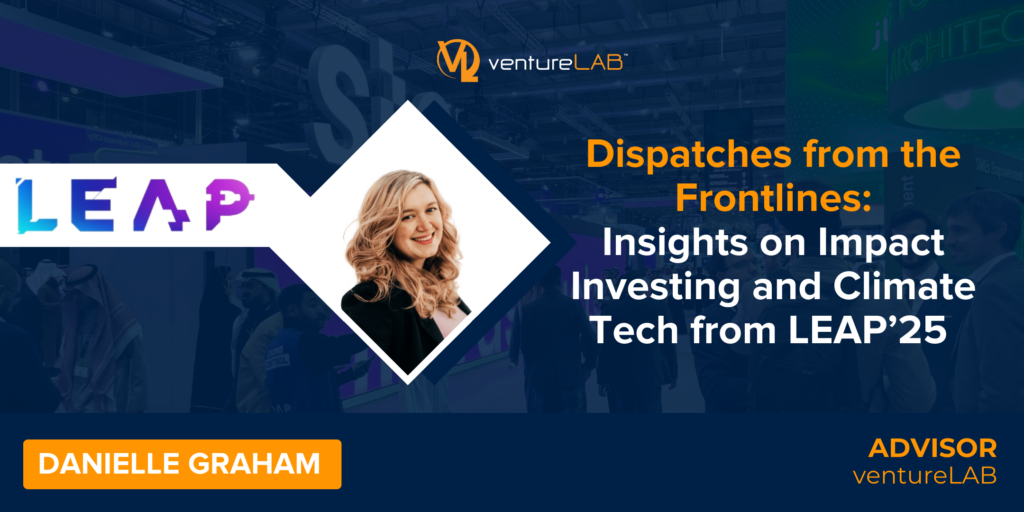Home » Frontline Insights: Impact Investing and Climate Tech Highlights from LEAP’25
Frontline Insights: Impact Investing and Climate Tech Highlights from LEAP’25

At LEAP'25 in Riyadh, Saudi Arabia, I had the opportunity to speak on the Climate Tech Stage about the vital relationship between impact investing and sustainable technologies. The panel emphasized how regional investment trends and local strategies can accelerate advancements in climate innovation while showcasing that impact investing can yield both social and financial returns.
As an Advisor for ventureLAB, Co-Founder of The Firehood, and General Partner at Phoenix Fire, I'm dedicated to supporting women-led startups that tackle pressing issues like climate action and gender equality. Our goal is to enhance access to capital for women entrepreneurs, collaborating with institutions like BDC, which operates Canada’s most active investment fund and was the first Canadian bank to achieve B Corp certification. Through initiatives like BDC's $500M women-focused investment fund, we've observed that intersectional investments in gender and climate are crucial to fostering a sustainable future.
Impact investing is more than just philanthropy; it aims to create measurable social and environmental benefits alongside financial returns. This model rejects the notion that investors must choose between "doing good" and "doing well." By investing in women-led ventures within climate tech and sustainable solutions, we demonstrate that diverse teams can generate better outcomes, both socially and financially.
Despite common misconceptions, impact investing does not necessitate sacrificing growth for social impact. In Canada, we work within frameworks that blend ESG and impact measurements. Internationally, regions vary in their approaches—for example, Europe adopts regulatory frameworks like the EU Green Deal, while North America leans more on private capital investments. At The Firehood, we assess both financial success (revenue growth, market scalability) and impact metrics (CO2 reduction, community benefits).
AI presents both opportunities and challenges in the realm of impact investing. While AI can enhance efficiency and environmental impact, it also raises concerns, such as energy consumption. Companies like Xatoms use AI for water purification, exemplifying its potential for good. We emphasize investments in clean energy-powered AI models to address these challenges.
Understanding the global regulatory landscape is essential for navigating investment opportunities. Europe benefits from robust subsidies, while North America increasingly supports green tech through tax credits. The Middle East and North Africa are rapidly advancing in greening their policies. At The Firehood, we partner with local organizations like BDC to help our portfolio navigate these regulations.
Traditional venture capitalists are recognizing the financial potential of impact startups. We bridge the gap by collaborating with VCs on deal flow sharing and due diligence, encouraging them to include impact metrics in their assessments. By providing de-risked capital, we attract further investment, highlighting the value of integrating impact into the investment framework.
Science-driven ventures require patient capital, often needing 7-10 years to mature. Our fund structures incorporate varied capital sources, while we educate Limited Partners about the significance of long-term returns from climate solutions.
Standardizing impact metrics remains a challenge, but we are making progress by aligning our metrics with global frameworks. At The Firehood, we track sustainability and diversity metrics to ensure accountability and genuine impact.
The future of climate tech is promising, with emerging technologies like energy-efficient AI applications, carbon capture, lab-grown proteins, and advancements in battery storage. These innovations have the potential to revolutionize resource use and emissions reduction.
In conclusion, the intersection of climate tech and impact investing is transformative. By prioritizing diverse teams and long-term capital, we can drive sustainable and inclusive solutions. Collaboration across sectors is paramount as we strive to empower those leading the changes for a better future.
VentureLAB
https://www.venturelab.ca/
ventureLAB is a leading global founder community for hardware technology and enterprise software companies in Canada. Our organization is led by seasoned entrepreneurs and business leaders with decades of industry experience in building IP-rich start-ups, scale-ups, and global multinationals to help you scale your business. Located at the heart of Ontario’s innovation corridor in York Region, ventureLAB is part of one of the biggest and most diverse tech communities in Canada. We enable technology startups to accelerate the commercialization of transformational products on a global scale.


